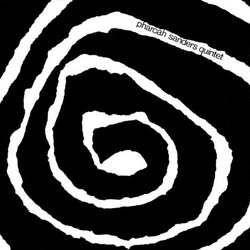| All Artists: Pharoah Sanders Title: Pharoah's First Members Wishing: 3 Total Copies: 0 Label: Esp Disk Ltd. Original Release Date: 1/1/2005 Re-Release Date: 3/15/2005 Genres: Jazz, Pop Styles: Avant Garde & Free Jazz, Bebop Number of Discs: 1 SwapaCD Credits: 1 UPC: 825481040082 |
Search - Pharoah Sanders :: Pharoah's First
 | Pharoah Sanders Pharoah's First Genres: Jazz, Pop
|
Larger Image |
CD DetailsSimilar CDs
|
CD ReviewsPharoah Sanders' Sensational Debut!!! Louie Bourland | Garden Grove CA | 05/06/2005 (5 out of 5 stars) ""Pharoah's First" is the 1964 debut release from tenor saxophonist and future John Coltrane sideman, Farrell "Pharoah" Sanders. Despite the album being his first, many of Sanders' musical trademarks are already apparent even at this early stage. His unique melodic approach along with his infamous atonal shreiks and howls can both be heard alongside stellar performances from the other members of his quintet featured in full prominence here. The album only includes two tracks but they are both extremely lengthy and include lots of space for free improvisation. Sanders' adventerous atonal runs in the opening track "Seven by Seven" are extraordinary while trumpeter Stan Foster displays a subtle Miles Davis edge and pianist Jane Getz shines with a slight reference to McCoy Tyner. "Bethera" is also an extended piece but has more of a tonal center and is not quite as avant-garde as "Seven by Seven". Here, Sanders displays a melody that is definitely along the same lines as Coltrane and almost sounds like a "Love Supreme" outtake. His playing is less shreiking here and is more lyrical and melodic. Once again, the other members of the quintet shine with brilliance. The rhythm section of bassist William Bennett and drummer Marvin Pattillo offer some excellent exchanges towards the end of this lengthy piece. After listening to this album, it's easy to see why John Coltrane chose Pharoah Sanders to join his group just one year after Pharoah made this album. Pharoah's style was perfectly suited for what Coltrane was after musicially and it wasn't long after that Pharoah joined him for the groundbreaking classics "Ascension" and "Mediations", two monumental staples in free jazz. "Pharoah's First" is where it all began for Sanders though and the album also showed what was to come later on for this up-and-coming jazz legend. Excellent Debut!!!" The only example of early Sanders. Michael Stack | North Chelmsford, MA USA | 10/12/2005 (3 out of 5 stars) "People are shaped by events in their lives-- and indeed, you can pinpoint single moments in your life that after which nothing was the same. No doubt for Pharoah Sanders, playing in JOhn Coltrane's band was one such moment. Sanders joined Coltrane's band early on, and the influence Coltrane had on Sanders was huge (likewise, the influence that Sanders had on Coltrane was equally huge). But while there's a wealth of material out there from Coltrane before Sanders joined, there's precious little from Sanders beforehand. "Pharoah's First", recorded in Setpember of 1964, around the time Sanders first starting playing with Trane, is probably the only such example.
The album consists of two extended pieces-- "Seven By Seven" and "Bethera", performed by a quintet of Sanders, trumpeter Stan Foster, pianist Jane Getz (who burst onto the New York scene before moving to California and pretty much leaving jazz for other music forms), bassist William Bennett and drummer Marvin Pattillo. Each piece follows the same formula-- a brief, Monkish theme statement (written by Sanders in both cases) followed by solos from Sanders, Foster and Getz and either a brief collective improv (on "Seven by Seven") or rhythm section solos ("Bethera"). The music is more in the adventerous hard bop vein than anything else, akin to Coltrane's early '60s quartet work-- Sanders is remarkably restrained, playing melodic, rhythmic lines and only occasionally diving into the extended technique for which he's largely known. Foster plays in the Don Cherry school-- that sort of less-is-more from Miles Davis fused with a substantial amount of inventiveness. Getz is intriguing-- her style is agressive in the vein of a McCoy Tyner, but has that wide voicing that Alice Coltrane had. While these pieces are well performed, they're just not particularly attention getting-- it's decent advanced hard bop, but that's about it. This reissue does feature superb sound and a bunch of interviews with Sanders, which improves the value of the set for fans somewhat, but all in all, this is not an essential part of the Sanders catalog." |

 Track Listings (10) - Disc #1
Track Listings (10) - Disc #1